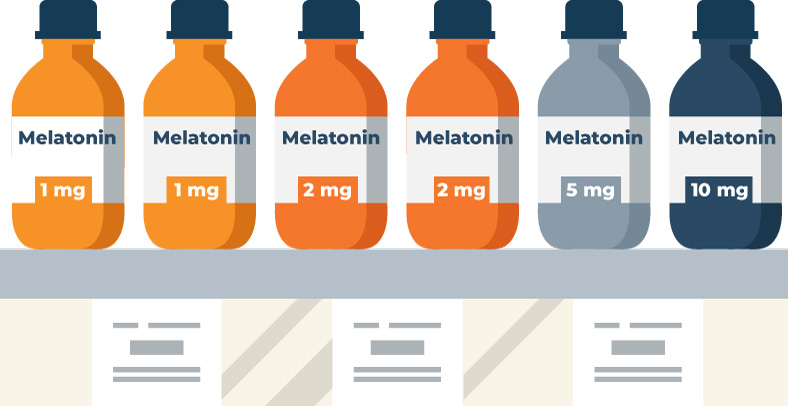Is it possible to overdose on melatonin? Can taking too much do harm?
If you’re asking this question, chances are you’ve considered trying supplements to help you sleep.
Many people take melatonin supplements to try and help themselves fall asleep faster or overcome the symptoms of jet lag. If you’ve been counting sheep for hours, it may be tempting to turn to supplements to get some sleep. However, if melatonin isn’t working, you might consider whether taking more of it would help and if it’s safe to do so.
Before we explain more, though, we encourage anyone considering taking melatonin to talk to their healthcare provider first.
Can You Overdose on Melatonin?
Is Melatonin Safe?
Melatonin is considered a relatively safe supplement1, with some common side effects that may include headache, dizziness, nausea, and daytime drowsiness.
However, OTC use of melatonin has been banned2 in Japan, Australia, the U.K., the European Union, and Canada. In these countries, the only way to take this hormone is as a prescription — but why?
Investigations3 into OTC products have discovered that because melatonin is not regulated (like a prescription medication is), melatonin supplements may contain doses that vary anywhere from -83 percent up to +478 percent of what is labeled on the bottle.
Need help? Check out our guide on the Best Melatonin Supplements.
While melatonin may cause unwanted side effects, the question as to whether or not you can experience a lethal overdose from it appears to be generally no. According to a 2022 case report4, a 42-year-old woman had attempted suicide by ingesting 120 milligrams of melatonin but survived.
That said, melatonin could be fatal in some cases with very young children. In a 2022 CDC report5, two children below the age of two died from melatonin ingestion. However, it’s important to add that exerts do not recommend6 giving melatonin to kids under three years old.
Melatonin Dosage
How Much Melatonin Should You Take?
Generally speaking, the ideal dose is the lowest possible dose that provides the desired effects. According to the Cleveland Clinic7, you can start with 1 milligram of melatonin and increase that amount by an additional milligram every week until you get the desired effect. That said, most doctors recommend8 a maximum dosage of 5 milligrams for insomnia and remind patients that higher doses tend to work just as well as lower doses. In fact, in some patients who take very high doses, an inverse effect can occur, including side effects9 like anxiety, nightmares, headaches, and insomnia.
We recommend talking to your doctor before introducing melatonin or any other supplements, especially if you take other medications or have certain health conditions.

5mg Dosage
In one study10 comparing the effects of 1 milligram and 5 milligrams, participants who took 5 milligrams showed an overall improvement in subjective sleep quality but actually slept for less time than those who took 1 milligram. The study also showed that 5 milligrams was the most effective dosage for jet lag.10
10mg Dosage
In one classic study11 from 2000, researchers used 10 milligrams of melatonin to regulate circadian rhythm disorders in people who are blind. 10 milligrams was effective in this case, but the authors of the study concluded that this dose should always be supervised by a physician.11
20mg Dosage
A 20-milligram melatonin dosage should only be used for specific purposes under the supervision of a doctor. For example, some older research12 has looked at the use of 20 milligrams of melatonin combined with cancer treatments like radiation and chemotherapy. The researchers found that melatonin could help lower the toxicity of certain substances in chemotherapy. They also found a decrease in adverse effects resulting from this treatment.12
30mg Dosage
A 30-milligram dosage is substantial. Some studies13 have used 20-40 milligrams to prevent and treat clot-forming cells (thrombocytopenia) associated with cancer chemotherapy.
40mg Dosage
As mentioned above, doses in the range of 20-40 milligrams could help with clot-form cells linked to chemotherapy treatments.13 That being said, this amount is far too high to take on your own, and we would advise against this. If you or someone you know is a cancer patient experiencing clotting issues, you might consider bringing this up with the doctor, though.
100mg Dosage
100 milligrams of melatonin is a serious dosage, and it shouldn’t be used at all. It’s important to note that taking this much melatonin would likely result in a lot of unwanted — and potentially harmful — side effects.
Melatonin Side Effects
Daytime Sleepiness
Drowsiness is one of the most visible and common side effects of taking melatonin.1 This is particularly harmful if you take it at the wrong time of the day. For example, it could lead to increased risks when operating certain heavy machinery or driving, so always take melatonin about one or two hours before bedtime.
Hormonal Changes
Some studies show that children who take melatonin during adolescence might experience delayed puberty14 since melatonin plays a role in triggering puberty.
Other studies have looked at melatonin’s impacts on fertility15 in people trying to get pregnant. They found that melatonin increased pregnancy rates but not live birth rates.15 However, we strongly encourage anyone who is pregnant or trying to get pregnant to talk to their healthcare provider before taking this supplement.
Headaches
Another possible consequence of taking melatonin is a headache.1 That said, some research has found that melatonin supplements may help with migraines16. If you have concerns about headaches or migraines, talk to your doctor about treatment options.
Dizziness
Dizziness could be another unpleasant side effect of taking melatonin.1 This symptom could be especially harmful for older adults, who may experience an injury17 as a result.
Nausea
People who take melatonin may also experience nausea.1 However, other stomach issues may arise as well, though they are less common. These can include cramps, diarrhea, constipation, and decreased appetite.1
Vivid Dreams and Nightmares
Another side effect of taking melatonin is vivid dreams or nightmares18. However, it’s not clear whether melatonin directly causes this. Rather, it may be because supplementary melatonin seems to increase the time we spend in REM sleep – the stage of sleep when we dream.17
Melatonin Overdose FAQs
What is the lethal dose of melatonin?
Every single medicine has its own LD 5019, which is the lethal dose when 50 percent of the experimental subjects would die of exposure. Melatonin is known to be relatively safe, and in animal testing, an LD50 couldn’t be established.9
However, melatonin can be lethal in very young children, and it’s recommended that children under three years of age avoid these supplements.5,6
How long does melatonin last?
The plasma half-life for melatonin is short and ranges between 45 and 90 minutes20. This means that approximately only half of the dose remains in your system after this amount of time.20
While melatonin may help you fall asleep faster, it likely won’t help you to stay asleep or increase the quality of your sleep unless you are taking an extended or prolonged-release melatonin supplement. Extended-release medications or supplements are designed to be released into the body over a longer period.
Can kids overdose on melatonin?
Yes, kids can overdose on melatonin21, and the signs a child has taken too much can include an upset stomach, vomiting, diarrhea, and tiredness.
A 10-year study found that from 2012-2021, the number of children ingesting melatonin increased by as much as 530 percent.5 They went on to say that hospitalizations and more severe symptoms also increased during this time, though these primarily resulted from unintentional ingestions. Among those more severe cases, five children had to be on mechanical ventilation, and two children under the age of two had died.5
As previously mentioned, though, experts advise that children under three should not take melatonin supplements.
Can you overdose on melatonin gummies?
Melatonin does not have an established lethal dose. Rather, if you ‘overdose’ on melatonin, this can mean you might experience undesirable symptoms from taking higher doses, such as anxiety, nightmares, headaches, and insomnia.9
Is 20mg of melatonin too much?
A 20-milligram dosage is likely too much for many people who simply want melatonin to help them sleep. This dosage should only be used under the supervision of a doctor, so we don’t recommend you take this much without consulting one.
Our Conclusion
Some people may find melatonin supplements helpful, but it’s important to take them safely and with the approval of your healthcare provider. You may experience unwanted side effects from melatonin, but it’s generally considered safe. However, melatonin should be kept out of reach for very young children as this could be dangerous to them.

Jill Zwarensteyn
Editor
About Author
Jill Zwarensteyn is the Editor for Sleep Advisor and a Certified Sleep Science Coach. She is enthusiastic about providing helpful and engaging information on all things sleep and wellness.
Combination Sleeper
Education & Credentials
- Certified Sleep Science Coach
References:
- Bauer MD, Brent A. “Is melatonin a helpful sleep aid — and what should I know about melatonin side effects?”. Mayo Clinic. 2022.
- Grigg-Damberger MD, Madeleine M., Ianakieva MD, Dessislava. “Poor Quality Control of Over-the-Counter Melatonin: What They Say Is Often Not What You Get”. Journal of Clinical Sleep Medicine. 2017.
- Erland, Lauren A.E., Saxena PhD, Praveen K. “Melatonin Natural Health Products and Supplements: Presence of Serotonin and Significant Variability of Melatonin Content”. Journal of Clinical Sleep Medicine. 2017.
- Gutierrez Higueras, T., et al. “Attempted suicide by Melatonin overdose: Case report and literature review”. European Psychiatry. 2022.
- Lelak MD, Karima., et al. “Pediatric Melatonin Ingestions — United States, 2012–2021”. Centers for Disease Control and Prevention. Last modified June 2, 2022.
- Faley, Katie. “Melatonin for kids: How to safely get your child to sleep”. OSF Healthcare. Webpage accessed March 31, 2024.
- “Melatonin: How Much Should You Take?”. Cleveland Clinic. 2022.
- “Melatonin”. Family Doctor. Last modified August 2023.
- Savage, Rosemary A., et al. “Melatonin”. National Library of Medicine. Last modified August 8, 2023.
- Costello, Rebecca B., et al. “The effectiveness of melatonin for promoting healthy sleep: a rapid evidence assessment of the literature”. Nutrition Journal. 2014.
- Sack, R.L., et al. “Entrainment of free-running circadian rhythms by melatonin in blind people”. New England Journal of Medicine. 2000.
- Rondanelli, Mariangela., et al. “Update on the role of melatonin in the prevention of cancer tumorigenesis and in the management of cancer correlates, such as sleep-wake and mood disturbances: review and remarks”. Springer. 2013.
- Wang, Yi., et al. “Therapeutic strategies of melatonin in cancer patients: a systematic review and meta-analysis”. OncoTargets and Therapy. 2018.
- Boafo, Addo., et al. “Could long-term administration of melatonin to prepubertal children affect timing of puberty? A clinician’s perspective”. Nature and Science of Sleep. 2019.
- Hu, Kai-Lan., et al. “Melatonin Application in Assisted Reproductive Technology: A Systematic Review and Meta-Analysis of Randomized Trials”. Frontiers in Endocrinology. 2020.
- Long MD, Rujin., Zhu MD, Yousheng., Zhou MD, Shusheng. “Therapeutic role of melatonin in migraine prophylaxis: A systematic review”. Medicine. 2019.
- “Keep on Your Feet—Preventing Older Adult Falls”. Centers for Disease Control and Prevention. Last modified March 24, 2023.
- “Can Melatonin Cause Bad Dreams? What Experts Say”. Cleveland Clinic. 2021.
- “What is a LD50 and LC50?”. Canadian Centre for Occupational Health and Safety. Last modified November 12, 2018.
- Carloni, Silvia., et al. “Melatonin Pharmacokinetics Following Oral Administration in Preterm Neonates”. Molecules. 2017.
- “Melatonin Overdose in Children”. Cleveland Clinic. 2022.